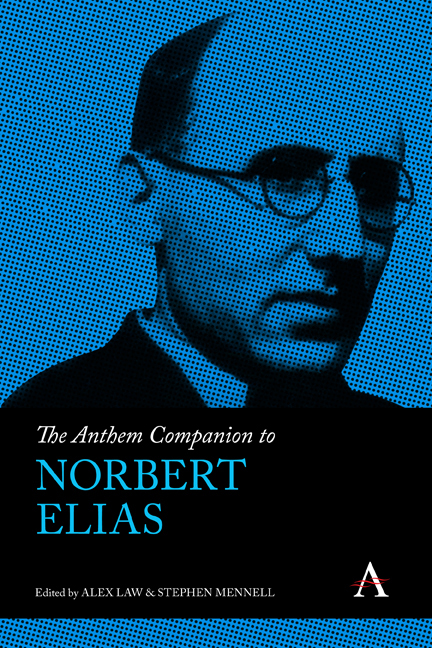Book contents
- Frontmatter
- Contents
- Notes On Contributors
- Acknowledgments
- Introduction: The Sociological Promise of Norbert Elias
- One Norbert Elias: Genesis of a Determined Thinker
- Two Knowledge, Science and Method: The Sociological Practice of Norbert Elias
- Three Norbert Elias’s Comparative Historical Sociology: Against Process Reduction
- Four Power and Process: Norbert Elias and the Paradox of Inequalities
- Five Norbert Elias and Shifting Gender Relations
- Six Travelling With Elias: Figurations and the Racialising Process in South Africa
- Seven Excitement Processes, Embodiment and Power Relations in Sport and Leisure
- Eight Warfare, Survival Units, National Habitus and Nationalism: Norbert Elias’s Contribution to Political Sociology
- Nine Elias’s Contribution to International Relations Theory: Towards a Global Sociology
- Ten Crime, Government and Civilisation: Rethinking Elias in Criminology
- Eleven Art and the Civilising Process
- Twelve From Social Mobility to Channels of Opportunity: Norbert Elias and Education
- Appendix: Published Works of Norbert Elias in English
- Index
Introduction: The Sociological Promise of Norbert Elias
Published online by Cambridge University Press: 28 February 2024
- Frontmatter
- Contents
- Notes On Contributors
- Acknowledgments
- Introduction: The Sociological Promise of Norbert Elias
- One Norbert Elias: Genesis of a Determined Thinker
- Two Knowledge, Science and Method: The Sociological Practice of Norbert Elias
- Three Norbert Elias’s Comparative Historical Sociology: Against Process Reduction
- Four Power and Process: Norbert Elias and the Paradox of Inequalities
- Five Norbert Elias and Shifting Gender Relations
- Six Travelling With Elias: Figurations and the Racialising Process in South Africa
- Seven Excitement Processes, Embodiment and Power Relations in Sport and Leisure
- Eight Warfare, Survival Units, National Habitus and Nationalism: Norbert Elias’s Contribution to Political Sociology
- Nine Elias’s Contribution to International Relations Theory: Towards a Global Sociology
- Ten Crime, Government and Civilisation: Rethinking Elias in Criminology
- Eleven Art and the Civilising Process
- Twelve From Social Mobility to Channels of Opportunity: Norbert Elias and Education
- Appendix: Published Works of Norbert Elias in English
- Index
Summary
Norbert Elias (1897–1990) has often been acclaimed as the ‘last great classical sociologist’. Zygmunt Bauman (1979, 117) recognised Elias as ‘the great sociologist of our time, who long ago anticipated solution to problems with which all sociologists all over the world keep trying (in vain) to come to grips’. While a great deal has changed, Bauman's assertion retains its currency. Elias broached apparently intractable problems that continue to haunt twenty-first century sociology. Across a long scientific life, Elias attempted to integrate empirically founded sociological knowledge with insights afforded by psychology and history. Yet for a long time, Elias was consigned to the margins of sociology. When broader recognition for his achievement arrived in the last three decades of the twentieth century, it was subject to misrepresentation, sometimes naive and sometimes gratuitous, as peddling a superannuated evolutionary or Eurocentric tradition. Against the activist temper of post-68 sociology, Elias's historical sense of sociological prudence smacked for some as the quietist apologetics of an aloof mandarin.
Despite Elias's legendary outsider status, the past four decades have witnessed an ascending curve of recognition by English-speaking scholars. This trajectory has been consolidated by the authoritative scholarly English edition of The Collected Works of Norbert Elias (UCD Press, 2006–14). Running to eighteen volumes, including three volumes of collected essays, fourteen books and a volume of interviews, the Collected Works amply demonstrates the scope and consistency of Elias's determination to reorientate sociology that he sustained, refined and distilled over more than six decades (see Appendix for a list of publications available in English). Elias's published output increased significantly after he retired from full-time teaching duties. Alongside the Collected Works as a fundamental resource for scholars, previously unpublished work, lectures and drafts have more recently been made available that allow us to look over Elias’s shoulder as he engaged in the creative process of further developing his model of sociology.
- Type
- Chapter
- Information
- The Anthem Companion to Norbert Elias , pp. 1 - 16Publisher: Anthem PressPrint publication year: 2023



